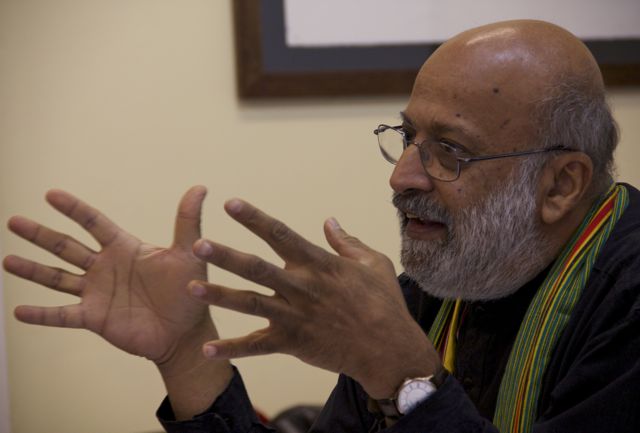
Contributing to the interdisciplinary colloquium entitled, Lineages of Freedom, which took place recently, Firoze Manji spoke on the topic: ‘Pan African Perspectives on Current Struggles’. Born in Kenya, Manji is an activist, internationally respected scholar and the founder and former editor-in-chief of Pambazuka News, a pan-African email and online newsletter committed to social justice.
Manji began by discussing the problem of memory or, amnesia, on the African continent, which has constructed mistaken identities and allowed injustices to persist. Echoing the sentiments of previous speakers, Manji asked: “How do we re-establish memory and break silences?”
The capitalistic nature of the relationship between Europe and Africa is one of the silences we must contend with, said Manji. The reality of a ‘capitalistic state’ must be acknowledged to begin to challenge present-day inequities. He defined the ANC’s failure to usher in progress as a conflict between commitments to the neoliberal capital-driven agenda, and total sociopolitical transformation.
Lamenting South Africa’s previous devotion to the fundamental issue of justice, Manji drew a distinction between today and the 80s and early 90s, which were preoccupied with discussions of liberation. “Now debate is all about policy, not about power -- the power of people to determine their own future,” he said. Self-determination is thus the central issue, and the unfinished part of the African revolution.
Manji noted that an earnest critique of past liberation movements -- one that goes beyond a nostalgic reminiscence -- will involve admitting defeat in some areas. He stressed the importance of addressing questions about the past as a way of constructing a better future and contradicting feelings of dispossession left by colonialism and capitalism. “We have to have an epochal view of what we’re trying to achieve,” said Manji, “We have to look at our own history, not the history defined by others.”
The spirit of discontent that has awakened in people on the street, as expressed through the Arab Spring, is one encouraging sign, said Manji. Protests and uprisings suggest people are looking critically at oppressive systems and no longer accepting them as the only way. Such “constructed lies” as capitalism will never liberate everyone. Concluding, Manji said: “Development in a capitalistic state is the development of capital, not the development of people.”
Responding to Manji’s ideas, biologist and academic, Pauline Wynter spoke about her work which, as she said, exists “at the interface between ecology and society.” Hoping to extend the debate about history and memory beyond the social sciences, she challenged the Pan Africanist tendency to focus narrowly on the areas of history and politics. Discussions of history and lineage should be extended to the sciences to prevent scientists from reacting to crises with knee-jerk “technical responses,” but rather, taking a broader view before considering solutions.
Insisting upon the importance of memory beyond realms formal learning, Wynter noted that erasure often poses the greatest threat to practical knowledge, as in such areas as agriculture and farming and other skills crucial for livelihoods. “Memory is also in skills,” said Wynter.
Photo and story by Hailey Gaunt
